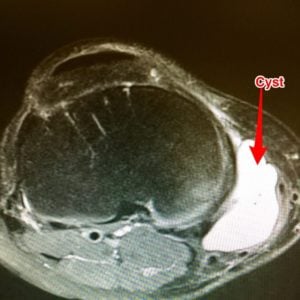
Parameniscal cysts are a very common finding on a knee MRI. The word parameniscal means “next to the meniscus”. A cyst is simply a fluid-filled space or sack. These are different than the more common Bakers Cyst we tend to get in the back of our knee.
The meniscus is a c-shaped cartilage disc inside the knee. The meniscus helps to absorb stress to minimize the risk of developing arthritis. Meniscus tears are very common. In this popular post, we talk about whether or not a meniscus tear can heal on its own.
What is a parameniscal cyst?
If a meniscus tear has been present for a while then the fluid in our knee joint can leak out through the tear. The fluid will form a cyst. That fluid filled area is now called a “parameniscal cyst”. Sometimes these cysts can become quite large. Cysts that form on the inner part of the knee tend to be larger than cysts on the outer or lateral aspect of the knee.
Lateral meniscus cysts tend to be smaller than medial meniscus cysts because the very tight ITB tendon limits the growth of the cysts on the outside of our knee.
Lateral meniscus cysts also tend to hurt more than medial meniscus cysts because of the pressure they put on the ITB tendon.
Are parameniscal cysts dangerous?
A parameniscal cyst is not dangerous. They rarely need to be removed. In some patients, a parameniscal cyst will become very large. In those cases, the way to treat the cyst is to repair the meniscus tear. If the tear is repaired then fluid from within the knee can no longer enter the cyst. Surgery to remove a parameniscal cyst is very rarely needed. Once the tear is treated the cyst will usually go away on its own.















Hello,
I had a small parameniscal cyst aspirated and injected with steroid about 8 days ago. I was told that the cyst immediately shrunk and for the first two day, I had no pain. Now, I am in more pain than before the procedure, especially after any physical activity. Is this kind of pain normal post aspiration? And is it expected to decrease on its own? I was told to take ibeprophen and ice it — but it’s not reducing the pain / burning in my knee.
Painful parameniscal cysts will usually not go away unless the meniscus tear associated with it is fixed. We are often able to repair these tears by suturing the tear together so the hole which allows the fluid to exit the knee and create the cyst is closed.
I am 21 and just found out from an MRI that I have a parameniscal cyst caused from a tear in my right meniscus on my right knee from when I was aged anywhere from 9-16 years of age. I’ve been in many accidents and have had pain with my knee for ever. I had it x-rayed with no answers but a knee brace for those majority years. I learned to live with not much control of my knee without a brace. I am waiting for an apt with the specialist for consultation because of how bad the tear is and how long I have been in pain. The cyst is what finally got doctors to believe me to get an MRI. What happens if I end up having my meniscus trimmed or nothing is left to salvage, how well will I be able to move my knee without the meniscus? They say are going to remove the cyst as well but now I see in previous comments most don’t get removed, what will benefit me from having it removed? They said stem cell would not benefit me at this point but I want as many opinions as possible on treatment and the best recovery to living as a 21 year old should.
HI Julia …
Most of these cysts do not require an additional open removal. Once the tear is repaired (sutured) or removed (surgeons call during surgery) then the cyst should go away on its own.
At your age you want to try and find someone who is willing to repair the tear. Any loss of meniscus tissue at a young age can lead to arthritis later on.
Hi
As of 2017 i was diagnosed with a complex lateral meniscus tear on my right knee and was on a cat 3 waiting list and as of 2019 mri results stated it was a large lateral meniscus tear with a parameniscal cyst still there, im currently have moved up to a cat 2 and waiting for my appointment in a week and wondering if they are likely to operate? . I go regularly to physio and over the past year and half of this injury had times of pain when i have taken strong anti- inflammatory drugs such as Tramadol . I think the tear is degenerative.
Horizontal cleavage tears with a lateral parameniscal cyst is a common cause of pain on the outer side of the knee. IT only needs surgery if your pain persists after a course of PT. It is a quality of life procedure. Most of these tears are repairable. That means we can suture them together and expect them to heal most of the time. Many docs might just cut the torn pieces out. Try to figure out which your surgeon plans on doing. The more meniscus you keep the less your chance of developing arthritis.
Hi Dr Luks
I am currently 10 months post injury and got a new MRI today. It was reported that I have partial ACL tear with tear on the medial meniscus (4.9×3.3mm) which may represent meniscus cyst. Currently I have occasional pain while walking and cannot stand or walk long due to muscle weakness. I am 26 and will be an intern in a hospital soon which require lots of standing and walking , what is your opinion for the best course of treatment?
HI … Often times resistance exercises will help you overcome the discomfort. These small cysts and most partial ACL tears should not require surgery. Consider working with a solid physical therapist or a certified trainer.
Dear Dr. Luks,
I got MRI result, and it showed “Horizontal tear of the entirety of the medial meniscus with anterior parameniscal cysts measuring up to 6mm. Cartilage surface irregularity without focal full-thickness defect…” I am very active (hiking, biking, skiing, diving,…) and the knee is functional but hurts a lot (even at night). Can it be fixed with arthroscopic surgery? What is a long term prognosis for such tear ? I will appreciate your expert advise. Thank you.
Hi… Many “horizontal cleavage” tears can be fixed or repaired. In the past surgeons simply cut out the torn pieces, but over the last decade, we have found that suture repairs actually work well in many people. The benefit of that is simply the fact that you do not lose any meniscus.
Anyways.. before considering surgery, you should go through a period of non-surgical management (6-8 weeks). That means physical therapy. It is very often effective at minimizing the pain due to a meniscus tear.